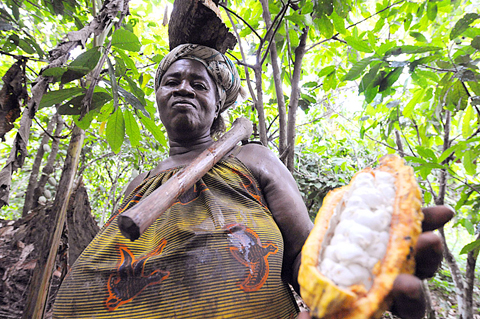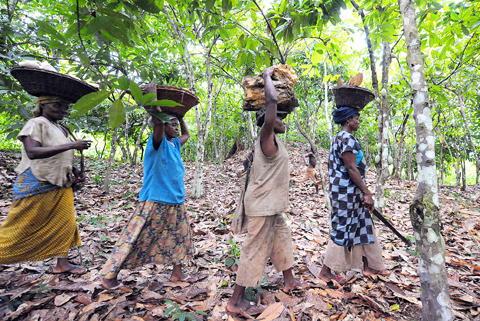Once it was the exclusive preserve of men but not any more: hundreds of women in Ivory Coast are ignoring patriarchal tradition and turning to the growing of cocoa.
Agathe Vanie, who founded an association of women growers in her village of Boko, said the reason was simple: “the misery of women in the face of the financial wealth of the men who own cocoa plantations.”
The association at Boko, which lies about 200km west of the capital Abidjan in the southern forest district of Divo, has grown to about 1,000 members since it was founded in 2005. It is the first — and thought to be the only one — of its kind in this west African country, finances its own costs and receives no state subsidies.

PHOTO: AFP
“Women cannot inherit or even create a cocoa plantation under our patriarch-dominated tradition,” said Vanie, criticizing what she called a “backwards and misogynist” practice.
“We decided, whatever it took, to … allow them to have plots of land,” said Vanie, whose country is the world’s largest producer and exporter of cocoa, accounting for more than 40 percent of the world’s cocoa production.
“I meet village chiefs and I explain to them that women can make a contribution to expenses that are increasingly heavy because of the cost of living and the price of food,” she said. “To begin with the reply was brutal and final: ‘No! A woman does not have the right to own a plantation and later give us orders.’”

PHOTO: AFP
But Clementine Galo, in her 70s, managed to become a woman cocoa planter and is happy today to have been one of those who took up the challenge.
“I was abandoned by my husband and I have only the plantation to meet my needs and prepare for my final days,” she said, standing by her trees, spread over two hectares, with their yellow pods of ripe beans.
Nearby, her friend Henriette Gneza proudly showed off her 20 hectares.
Last year she harvested 10 tonnes of beans and with the income paid school fees for her two children.
She could do even better this year, with prices of beans expected to rise.
The association also seeks to organize women into cooperatives to win new recruits to look after aging plantations.
But it has been an uphill battle in a country of 20 million where despite women’s increasingly active role in society, men still tend to make the decisions, head families and settle arguments.
“This activity gives them financial independence and lets them fight poverty in rural areas,” said Antoine Anon Dokou, a member of the association.
A report from the United Nations Development Program found that the poverty level in Ivory Coast reached 43 percent of the population last year, three or four points up on the figure in 2002 when civil strife split the country.
Women in the countryside are often the hardest-hit.
Vanie’s association wants to see her initiative copied and would like to launch a federation of women coffee and cocoa producers.
“Women have overcome their fear of men and difficulties in getting credit,” association treasurer Veronique Gopo said. “We are going out to win over our sisters in other regions.”
“We talk about ... the emancipation of women,” said Boko village chief Pierre Gbaza Zohouri, who backs the project. “In town you share household costs. Why not in the village?”
“They have my blessing,” he added with a hint of resignation.

SECURITY: As China is ‘reshaping’ Hong Kong’s population, Taiwan must raise the eligibility threshold for applications from Hong Kongers, Chiu Chui-cheng said When Hong Kong and Macau citizens apply for residency in Taiwan, it would be under a new category that includes a “national security observation period,” Mainland Affairs Council (MAC) Minister Chiu Chui-cheng (邱垂正) said yesterday. President William Lai (賴清德) on March 13 announced 17 strategies to counter China’s aggression toward Taiwan, including incorporating national security considerations into the review process for residency applications from Hong Kong and Macau citizens. The situation in Hong Kong is constantly changing, Chiu said to media yesterday on the sidelines of the Taipei Technology Run hosted by the Taipei Neihu Technology Park Development Association. With

CARROT AND STICK: While unrelenting in its military threats, China attracted nearly 40,000 Taiwanese to over 400 business events last year Nearly 40,000 Taiwanese last year joined industry events in China, such as conferences and trade fairs, supported by the Chinese government, a study showed yesterday, as Beijing ramps up a charm offensive toward Taipei alongside military pressure. China has long taken a carrot-and-stick approach to Taiwan, threatening it with the prospect of military action while reaching out to those it believes are amenable to Beijing’s point of view. Taiwanese security officials are wary of what they see as Beijing’s influence campaigns to sway public opinion after Taipei and Beijing gradually resumed travel links halted by the COVID-19 pandemic, but the scale of

A US Marine Corps regiment equipped with Naval Strike Missiles (NSM) is set to participate in the upcoming Balikatan 25 exercise in the Luzon Strait, marking the system’s first-ever deployment in the Philippines. US and Philippine officials have separately confirmed that the Navy Marine Expeditionary Ship Interdiction System (NMESIS) — the mobile launch platform for the Naval Strike Missile — would take part in the joint exercise. The missiles are being deployed to “a strategic first island chain chokepoint” in the waters between Taiwan proper and the Philippines, US-based Naval News reported. “The Luzon Strait and Bashi Channel represent a critical access

Pope Francis is be laid to rest on Saturday after lying in state for three days in St Peter’s Basilica, where the faithful are expected to flock to pay their respects to history’s first Latin American pontiff. The cardinals met yesterday in the Vatican’s synod hall to chart the next steps before a conclave begins to choose Francis’ successor, as condolences poured in from around the world. According to current norms, the conclave must begin between May 5 and 10. The cardinals set the funeral for Saturday at 10am in St Peter’s Square, to be celebrated by the dean of the College